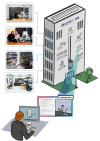| Both sides previous revisionPrevious revisionNext revision | Previous revisionNext revisionBoth sides next revision |
| teaching:gsoc2018 [2018/01/23 08:34] – [Google Summer of Code 2018] ahaidu | teaching:gsoc2018 [2018/01/23 08:48] – [Topic 4: Unreal Editor User Interface Development] ahaidu |
|---|
| ~~NOTOC~~ | ~~NOTOC~~ |
| |
| In the following we shortly present the open source frameworks that are participating for this year's Google Summer of Code. | In the following we shortly present the [[#software|open source frameworks]] that are participating for this year's Google Summer of Code. |
| |
| For the **proposed topics** see [[#proposed_topics|section]] further below. | For the **proposed topics** see [[#proposed_topics|section]] further below. |
| | |
| |
| ===== Software ===== | ===== Software ===== |
| | |
| ===== pracmln ===== | ===== pracmln ===== |
| |
| ==== Topic 2: Felxible perception pipeline manipulation for RoboSherlock ==== | ==== Topic 2: Felxible perception pipeline manipulation for RoboSherlock ==== |
| |
| {{ :teaching:gsoc:topic1_rs.png?nolink&200|}} | {{ :teaching:gsoc:topic1_rs.png?nolink&140|}} |
| |
| **Main Objective:** RoboSherlock is based on the unstructured information management paradigm and uses the uima library at it's core. The c++ implementation of this library is limited multiple ways. In this topic you will develop a module in order to flexibly manage perception pipelines by extending the current implementation to enable new modalities and run pipelines in parallel. This involves implementing an API for pipeline and data handling that is rooted in the domain of UIMA. | **Main Objective:** RoboSherlock is based on the unstructured information management paradigm and uses the uima library at it's core. The c++ implementation of this library is limited multiple ways. In this topic you will develop a module in order to flexibly manage perception pipelines by extending the current implementation to enable new modalities and run pipelines in parallel. This involves implementing an API for pipeline and data handling that is rooted in the domain of UIMA. |
| ==== Topic 3: Unreal - ROS 2 Integration ==== | ==== Topic 3: Unreal - ROS 2 Integration ==== |
| |
| {{ :teaching:gsoc:ue_ros2.png?nolink&200|}} | {{ :teaching:gsoc:ue_ros2.png?nolink&150|}} |
| |
| TODO | Since [[https://github.com/ros2/ros2/wiki|ROS2]] has cross platform support, it would be of a great advantage to wrap it as a module in the Unreal Engine framework. This would greatly improve communication between our RobCoG modules and the ROS world. As a further step the module should be extended to work under Linux as well. This can be done using the unreal build system ([[https://docs.unrealengine.com/latest/INT/Programming/UnrealBuildSystem/|UBT]]). |
| |
| **Task Difficulty:** The task is to be placed in the medium difficulty level, as it requires programming skills of various frameworks (ROS, Linux, Unreal Engine). | **Task Difficulty:** The task is to be placed in the medium difficulty level, as it requires programming skills of various frameworks (ROS, Linux, Unreal Engine). |
| {{ :teaching:gsoc:ue_editor.png?nolink&200|}} | {{ :teaching:gsoc:ue_editor.png?nolink&200|}} |
| |
| TODO | For this topic we would like to extend the modules from RobCoG with intuitive Unreal Engine Editor Panels. This would allow easier and faster manipulation/visualization of various parameters. |
| |
| **Task Difficulty:** The task is to be placed in the easy difficulty level, as it only requires familiarity with the [[https://docs.unrealengine.com/latest/INT/Programming/Slate/|SLATE]] framework from Unreal Engine. | **Task Difficulty:** The task is to be placed in the easy difficulty level, as it only requires familiarity with the [[https://docs.unrealengine.com/latest/INT/Programming/Slate/|SLATE]] framework from Unreal Engine. |












